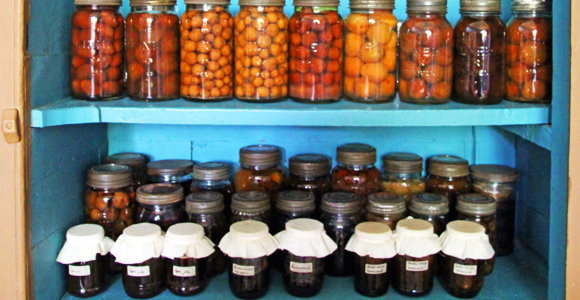When it comes to weight loss success and healthy weight maintenance, we need all the help we can get. Keeping certain ingredients on hand in your pantry can help aid your weight loss or weight maintenance efforts by setting you up for success. Having nutritious products at your immediate disposal will help ensure you're prepared to assemble all sorts of healthy meals and snacks. In addition to fresh ingredients, canned and dried goods are vital to a well-balanced diet.
Just as important as the foods you keep in your home are the foods you keep out of your home. This type of planning puts the phrase, "out of sight, out of mind" to work--if you don't keep unhealthy foods in your home, you're less likely to backslide and overeat those high-calorie foods.
Keep In Your Pantry
1. Herbs & Spices
The great thing about herbs and spices is that they can be used to add tons of flavor to your food without adding fat, salt, or sugar (which are often used to add flavor). Purchase the dried herbs and spices you'll use most often.
2. Canned Beans & Fish
These protein-packed staples can be used in a plethora of recipes, including side dishes and main meals. Stock up on dried or canned kidney, pinto, black, and lima beans, which can be easily added to soups, salads, and entrees. Keep canned salmon and tuna on hand to add quick, delicious, lean protein to casseroles, pastas, and salads.
3. Pasta & Rice
These basic ingredients, which are often sold in cheaper bulk-sized packages or can be found on sale, can be used in a multitude of recipes. Choose whole-grain pasta and brown rice to reap the most benefits, including more fiber, which helps you feel full faster and for longer between meals.
4. Canned Fruits & Vegetables
Although many people prefer fresh or frozen produce, canned fruits and veggies can be great additions to dishes and can be used as substitutions for higher-calorie ingredients in baked goods and desserts. Be sure to choose canned vegetables that are reduced-sodium or labeled "no salt added" and opt for fruit packed in its own juice.
5. Nuts & Dried Fruit
Use these pantry picks to make your own trail mix or eat them alone as a quick, nutrient-packed snack rich in healthy fats, fiber, vitamins, and minerals. Add them to your cereal, yogurt, and baked goods to up the antioxidant-ante of your favorite breakfast foods.
6. Canned Tomato Products
Load up on lycopene-rich (a powerful antioxidant) canned tomato sauce, tomato paste, and whole or diced tomatoes, which are essential components of a variety of recipes.
7. Oil
Stash a supply of canola and olive oil to use in cooking, baking, and making salad dressings to ensure you'll get enough heart-healthy fats in your diet.
8. Vinegar
This ingredient's ability to add distinct, complex flavors cannot be overstated. Use apple cider, rice, red wine, and balsamic vinegars to make your own dressings and marinades.
9. Baking Supplies
Reserve a permanent residence in your cabinets for flour, sugar (or sugar substitutes, if you prefer), baking powder, baking soda, and vanilla, which are fundamental for baking up some of your healthy favorites.
10. Canned & Powdered Milk
These dairy products last longer than fresh milk and are often cheaper. Follow package instructions to prepare them and use in place of fresh milk.
Kari Hartel, RD, LD is a Registered, Licensed Dietitian and freelance writer based out of St. Louis, MO. Kari is passionate about nutrition education and the prevention of chronic disease through a healthy diet and active lifestyle. Kari holds a Bachelor of Science in Dietetics from Southeast Missouri State University and is committed to helping people lead healthy lives. She completed a yearlong dietetic internship at OSF St. Francis Medical Center in Peoria, IL, where she worked with a multitude of clients and patients with complicated diagnoses. She planned, marketed, and implemented nutrition education programs and cooking demonstrations for the general public as well as for special populations, including patients with cancer, heart disease, diabetes, Alzheimer's disease, obesity, and school-aged children. Contact Kari at [email protected].



